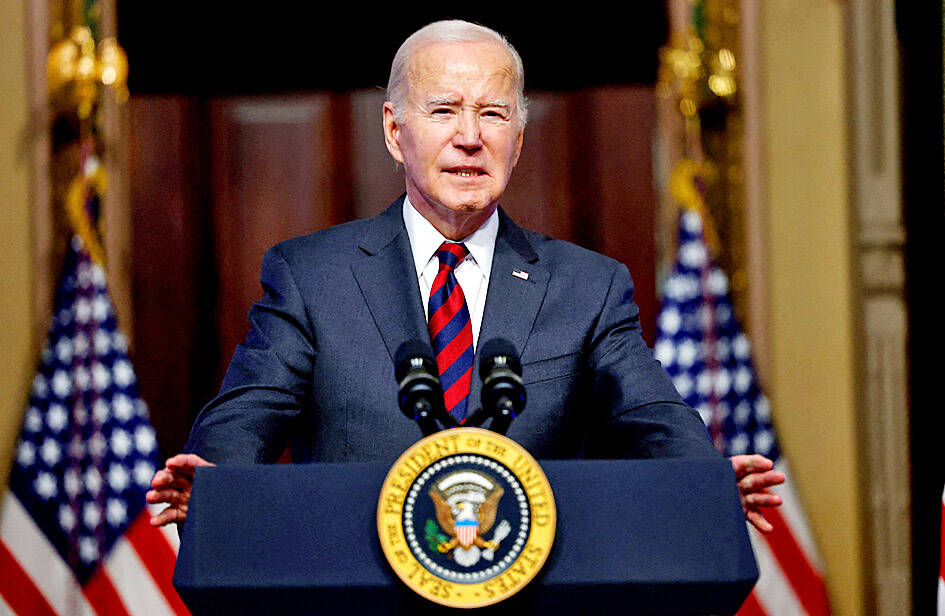US President Joe Biden’s administration is providing US$162 million to Microchip Technology Inc to support the domestic production of computer chips — the second funding announcement tied to a 2022 law designed to revive US semiconductor manufacturing.
The incentives include US$90 million to improve a plant in Colorado Springs, Colorado, and US$72 million to expand a factory in Gresham, Oregon, the US Department of Commerce in a statement said.
The investments would enable Microchip to triple its domestic production and reduce its dependence on foreign factories.

Photo: Reuters
Much of the money would fund the making of microcontrollers, which are used by the military as well as in autos, household appliances and medical devices. US government officials said they expected the investments to create 700 construction and manufacturing jobs over the next decade.
US National Economic Council Director Lael Brainard said that the funding would help to tame inflation.
“Semiconductors are the key input in so many goods that are vital to our economy,” said Brainard, adding that greater US production of chips would have reduced the supply problems that caused the cost of autos and washing machines, among other goods, to rise as the country emerged from the COVID-19 pandemic in 2021.
In August 2022, Biden signed the bipartisan CHIPS and Science Act, which provides more than US$52 billion to boost the development and manufacturing of semiconductors in the US.
Last month, the US Department of Commerce announced the first grants by saying it reached an agreement to provide US$35 million to BAE Systems Inc, which plans to expand a New Hampshire factory making chips for military aircraft, including F-15 and F-35 jets.
More than 570 firms have expressed interest in the CHIPS Act program, and US Secretary of Commerce Gina Raimondo has said the administration plans to make about a dozen awards this year.

NEW IDENTITY: Known for its software, India has expanded into hardware, with its semiconductor industry growing from US$38bn in 2023 to US$45bn to US$50bn India on Saturday inaugurated its first semiconductor assembly and test facility, a milestone in the government’s push to reduce dependence on foreign chipmakers and stake a claim in a sector dominated by China. Indian Prime Minister Narendra Modi opened US firm Micron Technology Inc’s semiconductor assembly, test and packaging unit in his home state of Gujarat, hailing the “dawn of a new era” for India’s technology ambitions. “When young Indians look back in the future, they will see this decade as the turning point in our tech future,” Modi told the event, which was broadcast on his YouTube channel. The plant would convert

‘SEISMIC SHIFT’: The researcher forecast there would be about 1.1 billion mobile shipments this year, down from 1.26 billion the prior year and erasing years of gains The global smartphone market is expected to contract 12.9 percent this year due to the unprecedented memorychip shortage, marking “a crisis like no other,” researcher International Data Corp (IDC) said. The new forecast, a dramatic revision down from earlier estimates, gives the latest accounting of the ongoing memory crunch that is affecting every corner of the electronics industry. The demand for advanced memory to power artificial intelligence (AI) tasks has drained global supply until well into next year and jeopardizes the business model of many smartphone makers. IDC forecast about 1.1 billion mobile shipments this year, down from 1.26 billion the prior

People stand in a Pokemon store in Tokyo on Thursday. One of the world highest-grossing franchises is celebrated its 30th anniversary yesterday.

Zimbabwe’s ban on raw lithium exports is forcing Chinese miners to rethink their strategy, speeding up plans to process the metal locally instead of shipping it to China’s vast rechargeable battery industry. The country is Africa’s largest lithium producer and has one of the world’s largest reserves, according to the US Geological Survey (USGS). Zimbabwe already banned the export of lithium ore in 2022 and last year announced it would halt exports of lithium concentrates from January next year. However, on Wednesday it imposed the ban with immediate effect, leaving unclear what the lithium mining sector would do in the